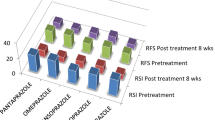Abstract
Laryngopharyngeal reflux (LPR) refers to the backflow of stomach contents into the throat that is into the hypopharynx. LPR is different from classical Gastroesophageal reflux disease (GERD) in many ways. Proton pump inhibitors have become the treatment of choice even though conflicting results exists in their response. Treatment requires acid suppression to be as complete as possible and treatment failure is not uncommon. In this article we present here our prospective study of 50 patients diagnosed as a case of LPR on the basis of reflux finding score and reflux symptom index. We tried to evaluate the role of PPI in LPR management by observing the effect of PPI on reflux finding score (RFS) and reflux symptom index (RFI) during the follow up period of 16 weeks.


Similar content being viewed by others
References
Koufman JA, Aviv JE, Casiano RR (2002) Laryngopharyngeal reflux; position statement of the committe on speech, voice, and swallowing disorders of the American academy of otolaryngology-head and neck surgery. Otolaryngol Head Neck Surg 127(1):32–35
Koufman JA (1991) The otolaryngologic manifestations of gastroesophageal reflux disease (GERD): a clinical investigation of 225 patients using ambulatory 24 hour pH monitoring and an experimental investigation of the role of acid and pepsin in the development laryngeal injury. Laryngoscope 101(suppl 52):1–78
Koufman JA, Amin MR, Panetti M (2000) Prevalence of reflux in 113 consecutive patients with laryngeal and voice disorders. Otolaryngol Head Neck Surg 123:385–388
Koufman JA, Weiner GJ, Wallace CW (1988) Reflux laryngitis and its sequelae; the diagnostic role of ambulatory 24 hour pH monitoring. J Voice 2:78–79
Vaezi MF, Hicks DM, Abelson TI (2003) Laryngeal signs and symptoms and GERD: a critical assessment of cause and effect association. Clin Gastroenterol Hepatol 1:333–344
Belfasky PC, Postma GN, Koufman JA (2002) The association between laryngeal pseudo sulcus and laryngopharyngeal reflux. In: American Academy of otolaryngology Head and Neck surgery Foundation, Denver, 2002
Sen P, Georgalas C (2005) A systematic review of the role of the proton pump inhibitors for symptoms of laryngo-pharyngeal reflux. Clin Otolaryngol 31:20–24
Delgaudio JM, Waring P (2003) Empiric esomeprazole in the treatment of laryngopharyngeal reflux. Laryngoscope 113:598–601
Belfasky PC, Postma GN (2001) The validity and reliability of reflux finding score. The laryngoscope 111:1313–1317
Belafsky PC, Postma GN, Koufman JA (2002) Validity and reliability of the reflux symptom index. J Voice 16:274–277
Mesallam TA, Stemple JC (2007) Reflux symptom index versus reflux fining score. Ann Otol Rhinol Laryngol 116:436–440
Kasper DL (2004) Harrison’s Principles of Internal Medicine, 16th edn. McGraw-Hill, Berkshire
Delahunty JE, Cherry J (1968) Experimentally produced vocal cord granulomas. Laryngoscope 78:1941–1947
Wiener GJ, Cooper JB, Wu WC, Koufman JA, Richter JE (1986) Is hoarseness an atypical manifestation of gastroesophageal reflux (GER)? An ambulatory 24 hour pH study. Gastroenterology 90:A1691
Koufman R, Toohil SR (1997) Consencus conference report. J Voice 10(3):215–216
Jecker P, Orloff LA et al (2005) Extraesophageal reflux and upper aero-digestive tract diseases. ORL 67:185–191
Mamede RC, De Mello-Filho FV, Vigario LC, Dantas RO (2000) Effect of gastroesophageal reflux on hypertrophy of the base of the tongue. Otolaryngol Head Neck Surg 122:607–610
Bilgen C, Ogut F (2003) The comparison of empiric proton pump inhibitor trial versus 24 hour double probe Ph monitoring in laryngopharyngeal reflux. J Laryngo Otol 117:386–390
Issing WJ, Karkos PD (2004) Dual probe 24 hour ambulatory pH monitoring for diagnosis of laryngopharyngeal reflux. J Laryngol Otol 118:845–848
Toros SZ, Toros AB (2008) Association of laryngopharyngeal manifestation and gastroesophageal reflux. Eur Arch Otorhinolaryngol 266(3):403–409
Karkos PD, Yates PD (2007) Is laryngo-pharyngeal reflux related to functional dysphonia. Ann Otol Rhinol Laryngol 116(1):24–29
Pieter Noordzij J, Khidir A (2002) Correlation of pH probe measured laryngopharyngeal reflux with symptoms and signs of reflux laryngitis. The Laryngoscope 112(12):2192–2195
Thomas R, Eubanks DO, Pablo E, Omelanczuk MD (2001) Pharyngeal pH monitoring in 222 with suspected laryngeal reflux. J Gastrointestinal Surg 5(2):183–191
Book DT, Rhee JS (2002) Perspectives in laryngo-pharyngeal reflux: an international survey. Laryngoscope 112:1399–1406
Tezer MS, Kockar MC (2006) Laryngopharyngeal reflux finding scores correlate with gastroesophageal reflux disease and helicobacter pylori expression. Acta Otolaryngol 126:958–961
Kamel PL, Hanson D (1994) Omeprazole for the treatment of posterior laryngitis. Am J Med 96:321–326
Amin MR, Postma G (2001) Proton pump resistance in the treatment of laryngopharyngeal reflux. Am J Otolaryngol Head Neck Surg 125(4):374–378
Jasperson D, Weber R (1996) Effect of omeprazole on the course of associated esophagitis and laryngitis. J Gastroenterol 31:765–767
Wo JM, Hunter JG (1997) Dual-channel ambulatory pH monitoring—a useful diagnostic tool. Dig Dis Sci 42:2222–2226
Hanson DG, Kamel PL et al (1995) Outcomes of anti-reflux therapy for the treatment of chronic laryngitis. Ann Otol Rhinol Laryngol 104:550–555
Metz DC, Childs ML (1997) Pilot study of the oral omeprazole test for reflux laryngitis. Otol Laryngol Head Neck Surg 116:41–46
Shaw GY, Searl JP (1997) Laryngeal manifestations of gastroesophageal reflux before and after treatment with omeprazole. South Med J 90:1115–1122
Tauber S, Gross M (2002) Association of laryngopharyngeal symptoms with gastroesophageal reflux disease. Laryngoscope 112(5):879–886
Williams RB, Szczesniak MM (2004) Predictors of outcome in an open label, therapeutic trial of high dose omeprazole in laryngitis. Am J Gastroenterol 99:777–785
Eherer AJ, Habermann W (2003) Effect of pantoprazole on the course of reflux associated laryngitis: a placebo controlled double blind crossover study. Scand J Gastroenterol 38:462–467
Wo JM, Koopman J (2006) Double-blind placebo control trial with single dose pantoprazole for laryngopharyngeal reflux. Am J Gastroenterol 101:1972–1978
Steward DL, Wilson KM, Kelly DH et al (2004) Proton pump inhibitor therapy for chronic laryngo-pharyngitis: a randomized placebo-control trial. Otolaryngol Head Neck Surg 131:342–350
Author information
Authors and Affiliations
Corresponding author
Rights and permissions
About this article
Cite this article
Patigaroo, S.A., Hashmi, S.F., Hasan, S.A. et al. Clinical Manifestations and Role of Proton Pump Inhibitors in the Management of Laryngopharyngeal Reflux. Indian J Otolaryngol Head Neck Surg 63, 182–189 (2011). https://doi.org/10.1007/s12070-011-0253-3
Published:
Issue Date:
DOI: https://doi.org/10.1007/s12070-011-0253-3




